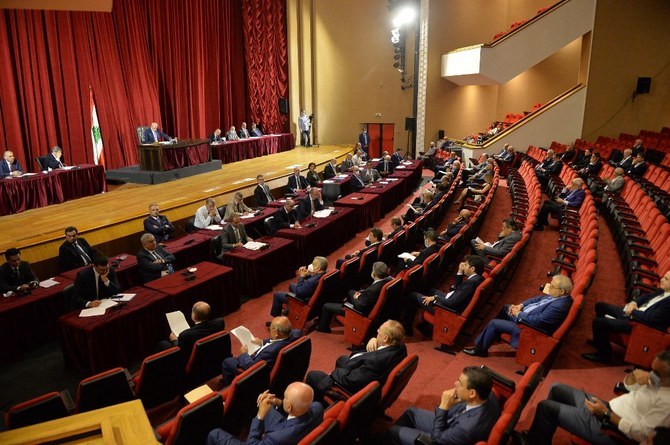
By Najia Houssari – arabnews.com — BEIRUT: Lebanon’s parliamentary blocs are pushing conflicting views over what should top the priority list of the crisis-hit country, with one MP warning of a “social explosion” if a policy of “patchwork solutions” remains unchanged. Some blocs believe that electing a president is the most pressing issue, while others say that legislation should be prioritized. This divergence reflects the depth of the political crisis that Lebanon is facing more than two weeks after President Michel Aoun’s departure from the presidential palace. Repeated failures to elect a successor have raised fears of a “power vacuum” in the country. In a meeting on Tuesday, 19 MPs representing 32 independent and reformist MPs in the Kataeb Party, the Democratic Renewal Movement, Project Watan, and the Independent Parliamentary Coalition said that “electing a president remains the priority.” The MPs said they will refuse to take part in legislative sessions, claiming these will “consolidate a presidential vacuum.”
A parliamentary source said this stance would be viewed as problematic by Speaker Nabih Berri and other blocs that support “legislation of necessity.” Some deputies who voted for presidential candidate Michel Moawad during the fifth parliamentary session said that “electing a president immediately is the key to realign the work of institutions, in accordance with the constitution and to save Lebanon.” Two other blocs, the Lebanese Forces and the Progressive Socialist Party, share the same position, but failed to attend the meeting on Tuesday. According to those present, the meeting was “an attempt to shape a significant opposition bloc in parliament that coordinates with other opposition blocs on presidential elections and future matters.”
Independent MP Bilal Houshaymi told Arab News: “Those who want to prioritize the presidential elections have the right to be supported and we do, in fact, support them. However, we cannot keep this stance forever. We witnessed a two-year presidential vacuum in Lebanon before. Does that mean that we should put legislation of necessity on hold?” He added: “We are with sovereign opposition, but when a political party disrupts the presidential elections for the sake of its candidate, we cannot do the same thing and disrupt the legislation of necessity. Some projects deal with people’s matters and we cannot ignore them. “We are not getting anywhere with the presidential elections and none of the candidates nominated by political parties can win. As independent MPs, we will not elect a president that protects Hezbollah’s weapon. We want a president that protects the people. Things cannot be resolved now.”
MP Imad Hout said: “If the process of electing a president by parliament takes so long, legislative sessions cannot be disrupted. Legislation of necessity doesn’t mean enacting any law, but people cannot be held hostage for the sake of electing a president.” Hout said that “Hezbollah’s determination of the characteristics of the presidential candidate does not hinder the election of the president, but rather opens the door for discussion.” He added: “Neither Hezbollah can come up with the president it wants, nor is any political party capable of securing 86 votes for one candidate or 65 votes in the second round. Everyone is trying to improve their conditions.” Berri had promised to approve the extension law for the security services in the joint committee session, but its approval depends on whether it is considered necessary legislation.
MP Fadi Karam from Lebanese Forces and a member of the Parliamentary Defense Committee, said: “There is no room for approving this law because we will not attend the legislative session. We cannot consider that the country can function without a president as if the position is of no importance. “Let those who obstruct and vote with blank papers bear the responsibility for the collapse. The policy of patchwork solutions has no value and will not save us. Rather, it is preparing for a social explosion and constitutional, administrative, social and financial chaos.” Confusion was evident during continuous sessions of the parliamentary committees, especially during the sessions of the Finance and Budget Committee, which discussed, on Wednesday, proposals for the laws of the Lebanese sovereign fund, which will be allocated to oil revenues in light of the demarcation of the maritime borders with Israel.
Some MPs expressed their concern about restricting this fund to sectarian accounts. On Tuesday, the Parliamentary Committee discussed the amendments to the draft Capital Control Law.



